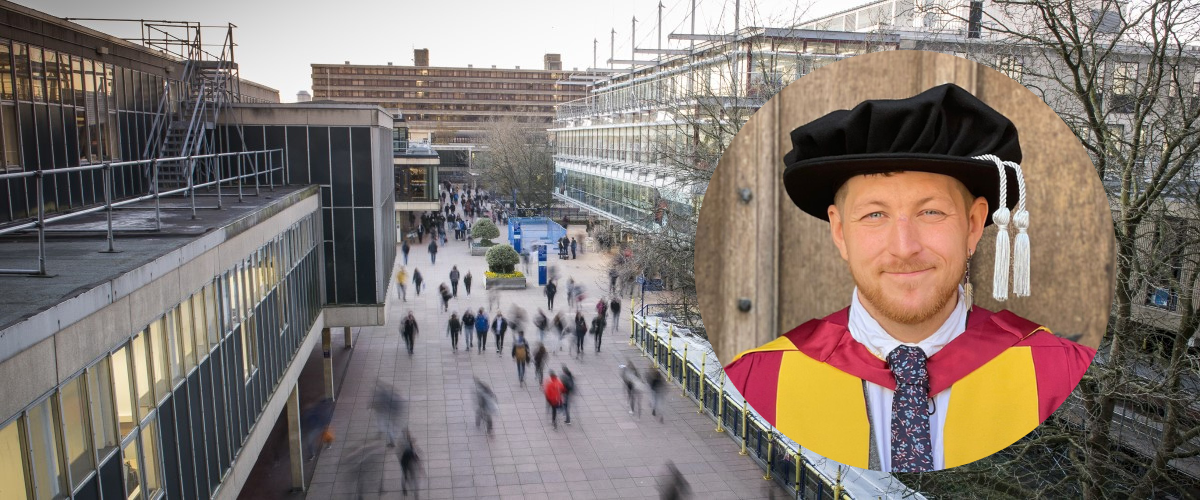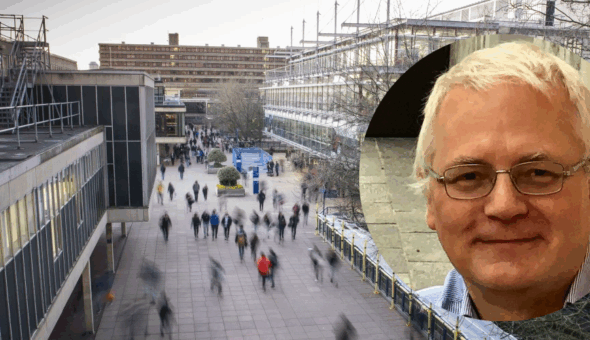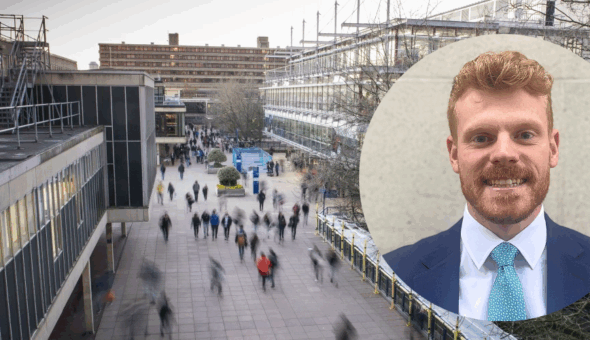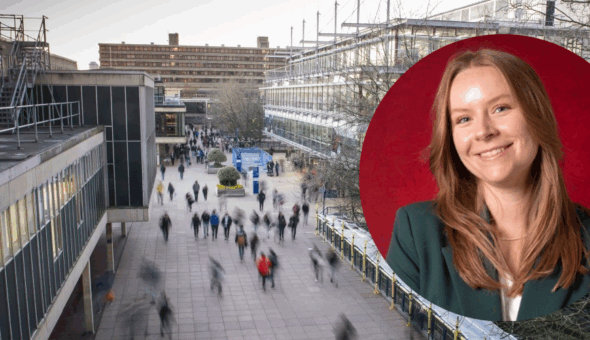Vlad’s journey at Bath took him from undergraduate chemistry to pioneering PhD research. During his PhD, he helped develop a biomaterial that supports brain and spinal cord cell regrowth, with the potential to treat serious injuries.
A triple alumnus, he found his academic passion somewhere between chemistry and engineering – and discovered that research thrives when there’s room to explore.
Why did you choose to do your PhD at Bath?
I did my undergraduate degree in chemistry at Bath and spent several summers doing research projects. I really enjoyed the research side of things, so I joined what is now the Institute for Sustainability and Climate Change for my master’s. Dr Hamideh Khanbareh was one of the supervisors during that year, and I did one of my master’s projects with her. That led naturally into the PhD through a donor-supported scholarship.
What made Bath stand out to you compared to other universities?
I’d already built good relationships with several chemistry supervisors. I appreciated the focus on sustainability and the quality of research here. That, combined with my existing connections, made it feel like the right place to stay.
Did you know what area you’d be researching before starting the PhD?
Not exactly. At the time, I was focused on the master’s year, while others were already thinking about their PhDs. Dr Hamideh’s project on piezoelectric energy harvesting really stood out. I’d done a pure chemistry undergrad and didn’t feel like a natural chemist – I found I was more at home in the overlap between chemistry and engineering, which materials science offered. It was a much better fit.
You published a paper, and the material you helped develop has real potential as a treatment. Is it being developed further?
Yes, one of Hamideh’s current PhD students has taken on the project. My work focused on proving the first principles – that our material could successfully stimulate brain cells to grow in desired ways, supporting healing. At the time, no one had attempted to stimulate neural stem cells using piezoelectric materials. Those cells are particularly tricky – they don’t always differentiate the way you want. Showing that our material could do that was an important step toward potential medical applications.
You must be proud of what you achieved during your PhD.
Definitely. But it’s a double-edged sword. You put in so much effort for three years, and although I’m proud, there’s still so much left to explore. I don’t have another three PhDs to keep going! Through the process, I learned a lot about what works and what doesn’t and how I work best as a researcher. If I’d known that at the start, I might have done some things differently, but that’s part of the journey.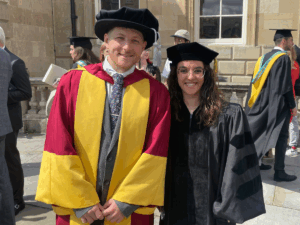
What did the Hughes PhD scholarship mean to you?
Honestly, it meant everything. I’ve had a complicated relationship with academia. Toward the end of my PhD, I was diagnosed with ADHD, and that changed how I approached everything. I did well at school but struggled at university. Lectures and mass information just didn’t suit me but hands-on lab work did. I loved doing summer research projects in my own time. I didn’t do great in my undergrad, but thanks to those projects, I got into the master’s programme.
The scholarship gave me an opportunity I didn’t think I’d ever have. It confirmed that I am a researcher and that I do have something to contribute to science. It gave me a path that wasn’t traditional, but one that led me to where I am now, and I’m happy.
What’s a typical day like for you?
There’s a rhythm, but it’s quite different from my time at Bath's Innovation Centre for Applied Sustainable Technologies. Back then, I interacted regularly with industrial partners – writing project proposals, setting up collaborations, and helping bridge the gap between academia and industry.
Now, my work is more lab-based. I’m part of a small research team trying to solve a specific problem. I collaborate closely with another materials scientist and we alternate between developing and testing materials.
A typical day is: get in, run experiments, analyse the data, and if there’s time, squeeze in some side research. A lot of academic life involves planning for the next step, jobs aren’t always secure long term. I’m looking into fellowships at the moment, figuring out what I’m qualified for and what groundwork I need to lay to get there.
Do you want to stay in research?
Yes, I love how innovative it is. In academia, you can try something out just to see if it works. If it fails, it’s part of the process. That exploratory freedom might be a bit more constrained in industry, where you’re focused on a product.
How would you say your studies helped shape where you are now?
It’s hard to do cutting-edge research without a PhD, it’s kind of the baseline now.
My PhD was a bit unconventional. It didn’t sit squarely in chemistry or engineering; it was a mix. That gave me a broad skill set, which has been helpful in applying for roles outside a narrow field.
What kind of skills did you gain?
Lots! I worked with cellulose, which is a biodegradable polymer and explored piezoelectric energy harvesting. That’s all about converting mechanical pressure into electricity using ceramic materials. I did composites too, combining materials to make something better suited to a task.
I also grew neural stem cells, giving me experience in bio-related work and microscopy. I even learned software to count cells, which I later adapted to analyse composite cross-sections and particle sizes. It’s funny how often those random skills come in handy!
Did you ever meet your scholarship funders, Jon and Catherine Hughes?
Once in my first year, maybe even the end of my master’s year. They came to Bath and we had a brief chat about the project scope.
The scholarship allowed me to pursue the career and life path I’ve always wanted. It gave me a toolkit and skill set that’s incredibly versatile across the fields I’m passionate about, particularly sustainable materials.
I’m also grateful that the scholarship supported research that didn’t have to fit into a narrow niche. With more traditional funders, you often have to tailor your project to a specific goal, like developing a defined material or process. This scholarship allowed me to pursue something innovative and exciting without being boxed in.
That freedom made my PhD far more effective. I had the space to investigate broadly, follow curiosity and still produce quality work with publications. I don’t think I’d have had the same outcome with a traditional, tightly scoped PhD.
Do you have any advice for someone thinking of doing a PhD at Bath?
A passion for science is crucial, but what really makes or breaks a PhD is finding the right supervisor and support team. My relationship with Hamideh was central to my success. She supported me both academically and personally. When I needed time off for mental health, she was understanding and generous. It was always about coming back healthier and stronger, not clocking lab hours.
How did that support make a difference?
COVID hit during my PhD and with Hamideh’s encouragement, I used the time to write a literature review that ended up being published in a respected journal. Open communication and a strong supervisory relationship were key.
I also had another supervisor, Janet Scott, who sadly passed away. She was brilliant, one of those researchers who always had multiple solutions to any problem. Being around minds like that inspired me to push further and be a better scientist.
Having a team that supports and challenges you keeps you motivated through the inevitable ups and downs. You start a PhD not quite knowing what you're doing, and the right team can shape you into a capable researcher.
What about student life at Bath – any favourite ways to unwind?
I tried kickboxing in my first year and loved it – I stuck with it until my second PhD year when I had a bad knee injury. Kickboxing had a great community; it was social, supportive and welcoming. It wasn’t just about the sport; it was about belonging.
Being part of the Centre for Doctoral Training made a big difference. Having a cohort of people going through the same experience gave a sense of solidarity. You could share struggles and wins and feel less isolated.
I was quite introverted, but someone from my cohort – Scott Allen – adopted me as a friend. I just went to his wedding. I may not keep in touch with everyone, but finding your people during a PhD makes a big impact.
Respond
